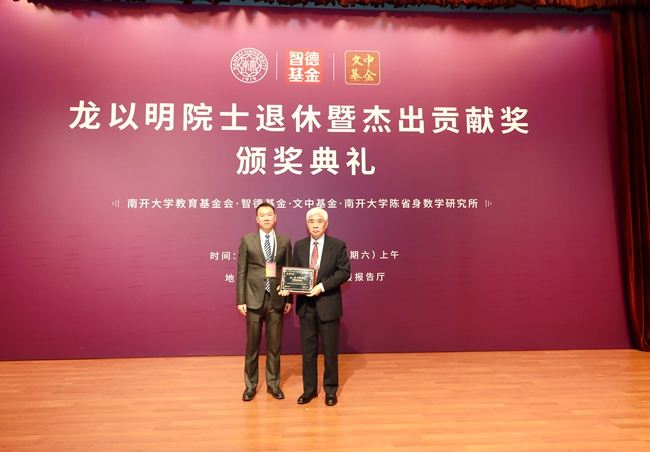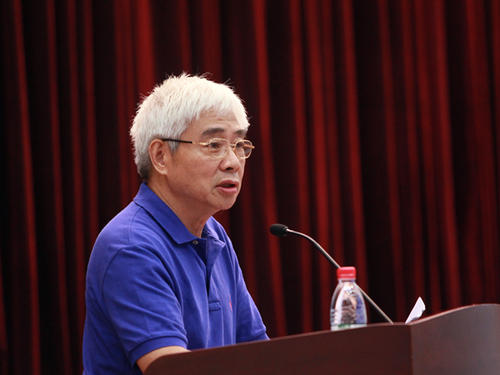Long Yiming: Dream Chaser for a Mathematical Powerhouse
Hard Work in Teaching and Research of Mathematics

Long Yiming proved the existence of countless periodic solutions of the perturbed superquadratic second-order Hamiltonian system, established the index theory of degenerate symplectic roads and the index function theory of general symplectic roads, and systematically established the index iteration theory of symplectic roads. He has obtained a series of systematic scientific research results.
Outstanding Doctoral Dissertation Award from Sigma Corsa Research Institute of the University of Wisconsin,Chen Shengshen Prize in Mathematics First Prize in Natural Science Award from the Ministry of Education and the Third World Academy of Sciences Prize in Mathematics ... Long's scholastic honors are awesome.
The Baosteel Education Foundation's Special Award for Outstanding Teacher, Special Model Worker in Tianjin City and the National Model Teacher ... These are the acknowledgments of Long Yiming's tireless teaching.
To all the honors, Long just responded with a smile: “I just did what a mathematics researcher and educator should do. I'm happy to be able to do my part in the training of Chinese mathematical talent and the development of mathematical science.”
The Reform and Opening-up Fulfills His Mathematical Dream

Long Yiming believes that China's Reform and Opening-up is the key factor to his success today.
Although Long Yiming had been interested in science since middle school, the beginning of the Cultural Revolution prevented him from continuing his studies.
In 1978, the restoration of the graduate student enrollment system changed it all. When he learned of the resumption of the college entrance examination and graduate student enrollment, Long Yiming was very excited. That year, Long, who had been studying mathematics on his own in his spare time, was admitted as a graduate student in the Department of Mathematics at Nankai University with the highest score in the entrance exam.
Due to the long period of closure of China, there was a huge gap between Chinese mathematics and foreign mathematics frontier research. If you want to keep up with the world's academic frontier, you have to study abroad. With the support of Deng Xiaoping, a large number of Chinese students, including Long Yiming, had the opportunity to study abroad for further studies.
In 1983, Long Yiming studied abroad for his PhD at the University of Wisconsin. With a good foundation in mathematics and a thirst for knowledge, Long Yiming achieved excellent results during his study abroad.
Although he had studied abroad for many years, he never thought of working in a foreign country. In 1988, Prof. Chen Xingshen went to Switzerland for a visit. Chen was very pleased to learn that Long Yiming planned to return to China. He encouraged Long to return to Nankai and join the newly established Institute of Mathematics of Nankai.
Upon his return to China, Long Yiming was further impressed by the more liberal academic environment after the Reform and Opening-up. Every year, the Institute of Mathematics of Nankai receives hundreds of scholars from home and abroad for academic exchanges. Many internationally renowned scholars come to give lectures and participate in academic discussions. It helps him to reach new heights in his academic career.
Striving for China to become a Mathematical Powerhouse

Since the Reform and Opening-up, China's scientific endeavors have developed rapidly over the past 30 years. Long Yiming said, “As far as the Chinese mathematical community is concerned, it has gained a greater voice in the international arena. Many top international mathematics conferences, such as the International Congress of Mathematicians, are convened in China. But compared with developed countries, our mathematics development is still some distance away.”
“A mathematical powerhouse should have mathematical masters and many profound research achievements in most fields of mathematics. This is where the gap between us and developed countries currently lies,” Long Yiming said.
According to Long, in order to train excellent mathematical talents, we must first develop young people's interest in mathematics. “The students must love their majors from the bottom of their hearts and be willing to put their efforts into it.” “Therefore, when I guide them in choosing their research directions, I pay special attention to cutting-edge and academically important topics, which should also be difficult to some extent, but can be fruitful if explored step by step with hard work.”









